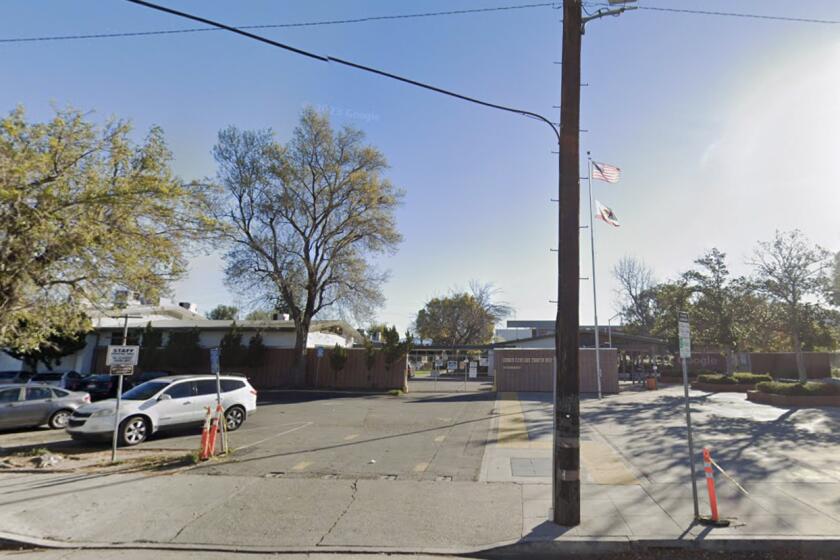Three lives and a literate city’s shame
There is a neighborhood in L.A. where you can hear people converse in the language spoken by the Aztec emperors Montezuma and Cuauhtemoc.
Julia Rodriguez lives there -- in Pico-Union, just west of downtown. She spoke only Nahuatl when she arrived in Los Angeles 15 years ago.
In L.A., she quickly taught herself to speak Spanish. But when she was growing up in a small village in Mexico’s Guerrero state, she never went to school. So she’d never been taught to read in any language.
“They never sent me,” she told me. “That’s how it is in the ranchos. People say, ‘What’s the use?’ But the truth is, it really is important.”
In Los Angeles, Julia found a job as a garment worker and eventually realized that bettering her future depended on learning to read and write. So did Juan Contreras, a cook at a downtown restaurant, who didn’t go to school as a child because his peasant father “rented” him out as a farmhand starting when he was 10 years old.
Mercedes Meza, a 64-year-old Westside housekeeper and nanny, always wanted to read too. She was born on a plantation outside the Honduran town of San Francisco de Becerra. Her earliest childhood memories are of washing the dishes and doing other household chores for the master’s family. She thinks she was 5 at the time.
“We had cows and chickens, corn and coffee trees . . . and a river with fish in it,” she told me. “It was a beautiful place and it had everything -- except a school.”
You and I take reading for granted. We don’t give much of a second thought to processing the information that reaches us in print and online. But to longtime L.A. residents Julia, Juan and Mercedes, the 26 vowels and consonants in English, the 29 in Spanish, are like hieroglyphs, indecipherable and taunting them every day.
“If you’re blind, you know you might trip or fall if you walk down the street,” Mercedes said. “Not knowing how to read or write is the same. Because every day we see these things we don’t understand and we feel helpless.”
Julia, Juan and Mercedes all told me they were deeply ashamed of being illiterate in the modern city they now call home. But the shame is really ours.
We Angelenos have allowed people from desperately poor places to come to our city to do the hardest jobs for the lowest wages. We all benefit from their labor, but many live among us with the private suffering and stigmas that are the legacy of the small Central American farms and Mexican villages where they were born.
The Census Bureau estimates that there are more than 200,000 Spanish-speaking people living in Los Angeles County who did not attend primary school as children.
Add up the American lives of just three of them -- Julia, Juan and Mercedes -- and you get three-quarters of a century of L.A. nanny work, clothes-making and meal-cooking. Giving them the alphabet and the ability to read and write the names of their children seems like the least we can do.
The good people at the Centro Latino for Literacy agree. The Pico-Union nonprofit recently announced the ambitious goal of teaching 10,000 Southern California adults to read and write in the next 10 months.
Many who walk into Centro Latino learning centers have waited decades to sit in a classroom.
“When I was growing up, I remember people saying, ‘A girl will never need to read,’ ” Mercedes Meza told me. “All she’s going to do is write letters to her boyfriend.”
At about the age most American boys are starting to leave behind picture books for more serious reading material, Juan Contreras was working the corn and bean harvests in hillside fields near Purandiro, in the Mexican state of Michoacan.
Contreras’ father would rent him out for five months at a time, receiving large bags of corn and beans as payment.
“I was the oldest so I never went to school because I had to help my parents,” Contreras told me. Embarrassed at his lack of education, he became a shy young man. When he arrived in Los Angeles in 1974, he took a job as a dishwasher.
Contreras is a survivor -- which explains how he was able to work and live in L.A. for more than three decades as an analfabeto. To get around the city, he memorized the shapes of street signs and the little nicks and other idiosyncrasies that distinguished one from another.
When he was promoted to cook, he memorized all the recipes. And when he went shopping for the menu ingredients at Grand Central Market, he showed vendors a list filled out by his boss.
When Julia Rodriguez landed her first job at a garment factory, she depended on the kindness of others.
“My supervisor told me I had to write my name and write how many pieces I had done, and I told him, ‘I can’t.’ ” A co-worker did it for her.
Then her husband was deported to Mexico and she was left alone at home with three young children. She depended on her Spanish-speaking neighbors to read doctor’s notes and school letters.
Rodriguez got a better job at the garment factory, operating a large steam iron. But she had reached a glass ceiling. The next job up required reading and writing the sizes and styles of clothes the factory produced.
She looked for other jobs, but each required a written application. “I was desperate and very sad,” she said. The garment factory work not only paid poorly, it was starting to eat away at her health.
For Mercedes Meza, learning to read was the end of a long battle with both the humble circumstances of her birth and the constant belittling of her husband.
Back in Honduras, she had left her village when she was 20 and moved to the capital city of Tegucigalpa. “That’s when the odyssey of my life really started,” she told me. She got married, took night-school classes and then stopped abruptly. “My husband got jealous,” she said. “He said the teacher was being too friendly with me. And I obeyed him.”
She shook her head as she told me the story. It’s as if she wanted to go back four decades to tell her former self not to listen to him. Her husband taught her to make a scrawl like a signature.
“That’s all he needed me to do,” Meza said.
“One day I’ll do it,” she told him. “One day I’ll go to school.”
Meza watched all four of her U.S.-born children earn high-school diplomas and became a grandmother too before she made good on that promise.
A friend gave her a piece of paper with an address she could not read. Asking people on the street for directions, she found the Centro Latino and entered the next chapter of her life story.
--
More to Read
Start your day right
Sign up for Essential California for news, features and recommendations from the L.A. Times and beyond in your inbox six days a week.
You may occasionally receive promotional content from the Los Angeles Times.







